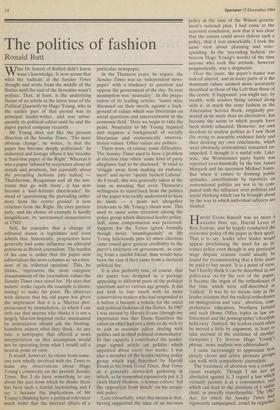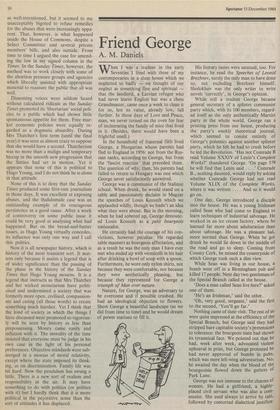The politics of fashion
Ronald Butt
What Dr Jowett of Balliol didn't know asn't knowledge. It now seems that what the 'radicals' at the Sunday Times thought and wrote from the middle of the Sixties until the end of the Seventies wasn't politics. That, at least, is the underlying theme of an article in the latest issue of the Political Quarterly by Hugo Young, who in the earlier part of that period was its principal leader-writer, and was subse- quently its political editor until he and the paper parted company recently.
Mr Young does not like the present direction of the Sunday Times. 'The most obvious change', he writes, is that the paper has become deeply politicised.' In industrial and foreign affairs it has become a 'hard-line paper of the Right'. Whereas it was a paper 'infused by scepticism about all creeds and positions, but especially about the prevailing fashions [my italics] — Thatcherism, Reaganism and all the nos- trums that go with them', it has now become a 'mid-Atlantic cheerleader'. In- stead of 'questioning the prevailing ortho- doxy from the centre ground' it now criticises from the Right. He cites particu- larly, and his choice of example is hardly insignificant, its 'unreasoned denunciation of CND'.
Still, he concedes that a change of editorial stance is legitimate and even admits that, historically, proprietors have generally had some influence on editorial positions in British journalism. The burden of his case is rather that the paper now editorialises the news columns as 'an exten- sion' of its 'editorial opinions'. This, he thinks, 'represents the most categoric abandonment of the journalistic values the Sunday Times once stood for.' He uses that miners' strike (again the example is illumi- nating) to make his point. He observes with distaste that his old paper has given the impression that it is a 'Marxist plot' prosecuted by intimidation, to which I can only say that anyone who thinks it is not a largely Marxist-inspired strike maintained by intimidation should ask the Notting- hamshire miners what they think. At any rate, a newspaper that offered a news interpretation on that assumption would not be operating from what I would call a neutral point of view.
It would, however, be otiose from some- one now wholly involved with the Times to make any observations about Hugo Young's comments on the present Sunday Times. But I do have something to say about the past from which he thinks there has been such a fearful backsliding and I say a because the implications of Mr Young's thinking have a political relevance much wider that the internal affairs of a
particular newspaper.
In the Thomson years, he argues, the Sunday Times was an 'independent news-
paper' with a tendency to question and oppose the government of the day. Its root assumption was 'neutrality'. In the prepa- ration of its leading articles, 'issues were discussed on their merits against a back- ground of values which was libertarian on social questions and interventionist in the economic field.' Here we begin to take the point. Neutrality to Mr Young required and requires a background of socially libertarian and economically interven- tionist values. Other values are politics.
There were, of course, some difficulties. The Sunday Times used to have a problem
at election time when 'some kind of party allegiance had to be disclosed.' It tried to `wriggle away from making an endorse- ment' and never 'openly backed Labour'.
As I recall, this was generally taken at the time as meaning that even Thomson's willingness to stand back from the politics of the paper was tacitly understood to have its limits — a point not altogether irrelevant to Mr Young's thesis now. This used to cause some irritation among the policy group which discussed leader-policy.
Still, some compensation was perceived.
Support for the Tories (given formally though never `unambiguously' as Mr Young felicitously puts it) when elections came round gave greater credibility to the paper's strictures on government, as com-
ing from a candid friend, than would have been the case if they came from a declared political foe.
It is also perfectly true, of course, that the paper was designed as a package appealing to different parts of the political spectrum and to various age groups. It did not wish to lose touch with its more conservative readers who had responded to it before it became a vehicle for the social and political fashions of the Sixties. In 1967 I was invited by Harold Evans (though my impression was that Denis Hamilton the editor-in-chief had not a little to do with it) to join as assistant editor dealing with politics and as chief political commentator. In that capacity I contributed the leader- page signed article on politics which appeared about every two weeks. I was also a member of the leader-writing policy group which was described by Harold
Evans in his book Good Times, Bad Times as a generally centre-left gathering in
which, as he somewhat expansively put it, I (with Harry Hodson, a former editor) led the opposition front bench' on his econo- mic policy.
Less colourfully, what this means is that, having supported the idea of an incomes policy at the time of the Wilson govern- ment's national plan, I had come to the reasoned conclusion, now that it was clear that the unions could never deliver such a policy, that it was unworkable. I took the same view about planning and over- spending. In the 'prevailing fashion' (to borrow Hugo Young's words) of the time anyone who took this attitude, however pragmatically, was a dogmatist.
Over the years, the paper's stance was indeed altered, and in many parts of it the dominant values seemed more accurately described as those of the Left than those of the centre. It happened, you might say, by stealth, with readers being carried along with it, in much the same fashion as the Alternative Service Book, originally pre- sented as no more than an alternative, has become the norm to which people have been slowly educated. However, my own freedom to analyse politics as I saw them (by trying to assemble evidence fairly and then drawing my own conclusions, which were obviously contentious) remained un- impeded. I thought it a useful role. Like- wise, the Westminster party battle was reported even-handedly by the late James Margach and his successor Michael Jones. But when it comes to forming public attitudes, contributions by reporters on conventional politics are not to be com- pared with the influence over political and social thinking which can be brought about by the way in which individual subjects are treated.
Harold Evans himself was no more a socialist than, say, Harold Lever or Roy Jenkins, and he largely conducted the economic policy of the paper in their spirit. That is to say, leader after leader would appear proclaiming the need for an in- comes policy even though in any particular wage dispute reasons could usually be found for recommending that a little more be paid to buy peace. It is a point of view, but I hardly think it can be described as not polittused. As for the rest of the paper, it became the organ of the orthodoxies of the time which were self-described as 'radical.' It was by no means only in the leader columns that the radical orthodoxies on immigration and `race', abortion, cornprehensive education, Northern Ireland and such Home Office topics as law en- forcement and the pornographer's freedom held sway. (Indeed, the leaders could often be moved a little by argument, at least to take account of the existence of anothe,r viewpoint.) To borrow Hugo Youngs phrase, news analysis was editorialised.
I came increasingly to appreciate hoW closely clever and active pressure grouPs can walk with sympathetic journalists.
The treatment of abortion was a conspi- cuous example. Though I am not an absolutist against it, I regard a law which virtually permits it as a convenience, and which can lead to the abortion of a viable child, as morally reprehensible. The 1961 Act, for which the Sunday Times had. vigorously campaigned, could be regarded
as well-intentioned, but it seemed to me unacceptably bigoted to refuse remedies for the abuses that were increasingly appa- rent. That, however, is what happened inside the House of Commons, despite a Select Committee and several private members' bills, and also outside. From time to time I argued the case for amend- ing the law in my signed column in the
Times. In the Sunday Times, however, the method was to work closely with some of
the abortion pressure groups and agencies which liberally assisted with appropriate material to reassure the public that all was well.
Dissenting voices were seldom heard without calculated ridicule as the Sunday Times promoted its 'libertarian' social poli- cies to a public which had shown little spontaneous appetite for them. Free mar- ket economic policies were equally re- garded as a dogmatic absurdity. During Mrs Thatcher's first term (until the final year) it was seen as almost crazy to suppose that she would have a second. Thatcherism was no more than a malign and temporary hiccup in the smooth new progression that the Sixties had set in motion. Yet it appears that none of this is political to Hugo Young, and I do not think he is alone in that attitude.
None of this is to deny that the Sunday Times produced some first-rate journalism in those days. It was excellent at exposing abuses, and the thalidomide case was an outstanding example of its courageous persistence in a good cause. After a week of controversy on some public issue it could be very good at analysing what had happened. But on the bread-and-butter issues, as Hugo Young virtually concedes, its influence was only one way and I call this politics.
Now it is all newspaper history, which is history of the most transient sort. It mat- ters only because it assists a legend that is of wider significance than the passing of the phase in the history of the Sunday Times that Hugo Young mourns. It is a legend that instructs us that Mrs Thatcher and her wicked monetarism have politi- cised and undermined a society that was formerly more open, civilised, compassion- ate and caring (all those words) to create something much harsher. Yet I think that the kind of society in which the things I have discussed were promoted so vigorous- ly will be seen by history as less than prepossessing. Money came easily and inflation with it. The morality of the time insisted that everyone must be judge in his own case in the light of his personal preferences. Objective standards were sub- merged in a morass of moral relativity, except where the state imposed its think- ing, as on discrimination. Family life was hit hard. Now the pendulum has swung a little. There is a new sort of realism and responsibility in the air. It may have something to do with politics (or politics with it) but I hardly think that it is more political in the pejorative sense than the sort of attitudes it has displaced.



















































 Previous page
Previous page